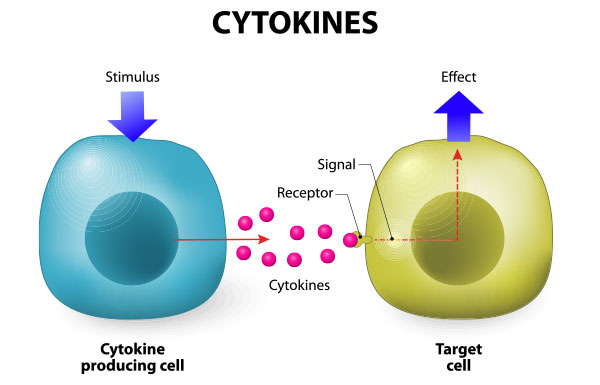Range of Cytokines and Chemokines and its Clinical Significance

Cytokines and chemokines are referred to as immune-modulating agents that intercede and amend the responses of the system. The term “cytokine” is generated by two different Greek words: “cyto” meaning cell and “kinos” meaning movement. On the other hand, “chemokines” is a family unit of small cytokines, secreted by cells. Cytokines play an important role in immune-related concerns, traumas, and anything associated with disease and health.
Cytokines and chemokines are superfluous secreted proteins with growth, differentiation, and activation functions. They standardize and determine the characters of the immune response, control group immune cell trafficking and therefore, the cellular arrangement of immune organs.
A cascade of responses is often seen related to cytokines; sometimes, several cytokines are required to synergize precise optimal function. A further perplexing variable in dissecting cytokine function is that every cytokine may have a different process.
Counting on the cellular source, target, and, most vital specific phase of the immune reaction during which it’s presented. Numerous cytokines have both pro-inflammatory and anti-inflammatory potential. Which activity is observed depends on the immune cells present and their state of responsiveness to the cytokine.
As of today, about 50 human chemokines are discovered, and they might be classified into four subfamilies (C, CC, CXC, and CX3C). The activation of chemokine-mediated pathways requires selective binding of chemokines to chemokine receptors which are expressed on surfaces of target cells. M Cytokine is the general term to describe small protein mediators produced by immune cells.
Generally, cytokines include the interleukins (IL), interferons (IFN), chemokines and tumour necrosis factor (TNF). Cytokines can act on several cells and play a spread of roles like in inflammation and cellular differentiation. It’s been shown that cytokines enhance or suppress the assembly of other cytokines3–5.
Therefore, it’s essential to specialize in cytokine networks to reveal the complicated, inflammatory pathogenesis in sepsis. Cytokine networks in chronic inflammatory diseases like atrophic arthritis have already been clarified, and effective cytokine-targeted therapies are developed.
Clinical significance
1.Tuberculosis, Pneumonia: Even though these studies suggest a definite cytokine profile in identifying VAP. It is necessary to distinguish the condition from Tb; fortunately, there are similar clinical signs and symptoms. One of the foremost widely analyzed areas of clinical cytokine is within the diagnosis of TB.
2.Surgical Site Infections: A combination of different infection pathologies is connected with cytokines. However, only a few are conventional as predicted by a particular cytokine. Infectious diseases like periprosthetic joint infection (PJI) possibly will be at risk after surgery for shoulder arthroplasty. It is considerably challenging to diagnose realizing the scarcity of biomarkers to differentiate between septic and aseptic outcomes.
3.Alzheimer’s disease and Neurological Outcomes in asystole Patients: Alzheimer’s Disease (AD) is well recognized as a disease caused by Inflammatory processes. Cit and cytokines have been drawn in its aetiology.
4.Gastric Cancer: Gastric cancer is an additional condition defined by an abnormal cytokine profile. Cytokines are used to identify cancer, and also the identification of other ailments. It sets a cutoff of a specific percentile instead of taking into account ROC statistical analysis for diagnostic efficacy.
5.Lupus Nephritis & Lymphohistiocytosis: Lupus nephritis and lymphohistiocytosis are chronic conditions of immune system deficiency. Lupus nephritis has been related to immune markers, including cytokines.
6.Plerixafor (Mozobil): Drafted for anti-HIV treatment is a robust CXCR4 antagonist that mobilizes hematopoietic stem cells.
7.Coronavirus disease 2019 (COVID-19) is caused by severe acute respiratory syndrome coronavirus 2 (SARS-CoV-2. Some COVID-19 patients experience severe symptoms of acute respiratory distress syndrome (ARDS), which has a high mortality. This high severity seems dependent on a cytokine storm, probably induced by the interleukin-6 (IL-6) amplifier. The cytokine storm and CRS in fatal COVID-19 cases are represented by several pathological features including ARDS, coagulation, and multi-organ dysfunctions.
8.Maraviroc: Maraviroc is a noncompetitive CCR5 antagonist that anticipates the binding of HIV envelope glycoprotein to CCR5. The medication of HIV-infected patients with CCR5 tropism, maraviroc-based regimen offers 70% to 79% of virologic response (HIV-1 RNA)

There is an ever-increasing number of tentative chemokine antagonists against most chemokine receptors. Potential chemokine receptor antagonists treat a wide variety of human diseases.
Conclusion
The establishment of clinical cytokine for diverse conditions could also be assisted by future improvement in our understanding of average cytokine profiles. To raise and understand, determine cytokine levels and diagnostic cutoffs in disease states, it’s essential first to characterize normal cytokine and chemokine levels in various populations. This will enable us to know how cytokines interact and modulate in different biochemical pathways in healthy individuals.
Significantly, the lack of research in specific diseases’ areas prevents the application of cytokines in diagnosis, gaining a far better understanding of basic cytokine profiles. It also will allow confirmation and supplementation or reconsideration, of diagnoses made through other diagnostic methods and clinical presentations.
Further, as usual, and diagnostic for these biomarkers be decoded, cytokines could be considered to upgrade patient outcomes when a definitive diagnosis is not possible with clinical features alone. Most diseases have very similar clinical features, and thus the establishment of pathological cytokine profiles may aid in the differentiation of such conditions.
To learn more about cytokines and chemokines contact Helvetica Health Care.
